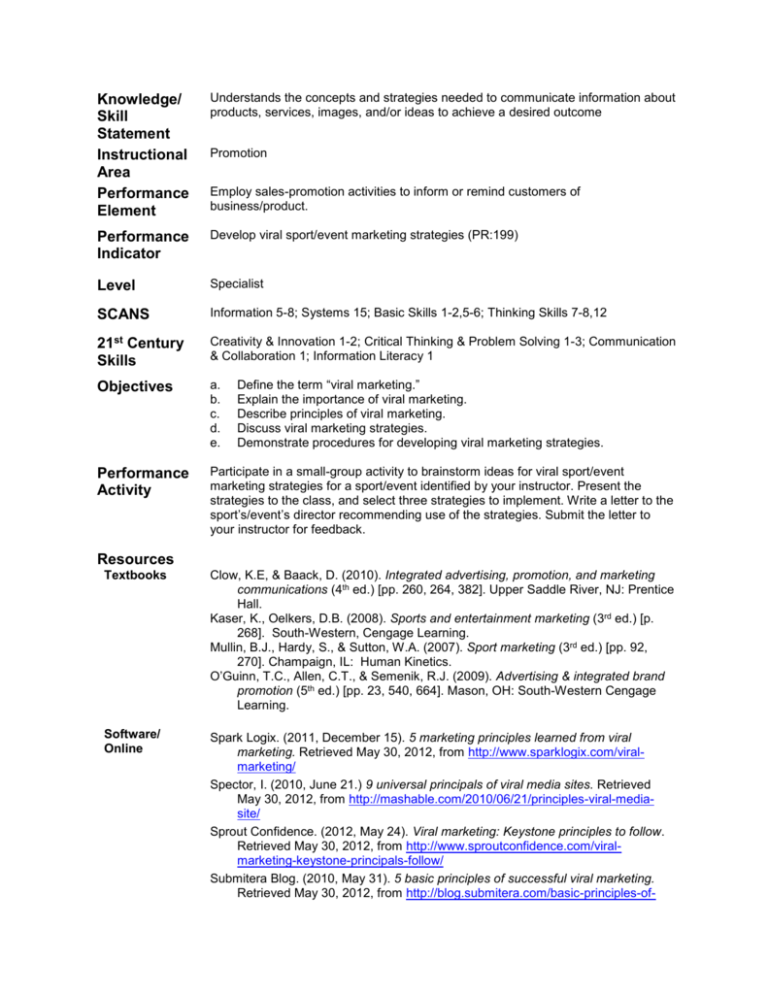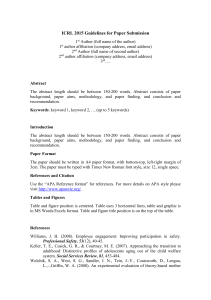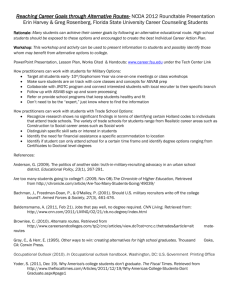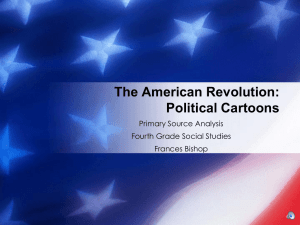
Knowledge/
Skill
Statement
Instructional
Area
Performance
Element
Understands the concepts and strategies needed to communicate information about
products, services, images, and/or ideas to achieve a desired outcome
Performance
Indicator
Develop viral sport/event marketing strategies (PR:199)
Level
Specialist
SCANS
Information 5-8; Systems 15; Basic Skills 1-2,5-6; Thinking Skills 7-8,12
21st Century
Skills
Creativity & Innovation 1-2; Critical Thinking & Problem Solving 1-3; Communication
& Collaboration 1; Information Literacy 1
Objectives
a.
b.
c.
d.
e.
Performance
Activity
Participate in a small-group activity to brainstorm ideas for viral sport/event
marketing strategies for a sport/event identified by your instructor. Present the
strategies to the class, and select three strategies to implement. Write a letter to the
sport’s/event’s director recommending use of the strategies. Submit the letter to
your instructor for feedback.
Promotion
Employ sales-promotion activities to inform or remind customers of
business/product.
Define the term “viral marketing.”
Explain the importance of viral marketing.
Describe principles of viral marketing.
Discuss viral marketing strategies.
Demonstrate procedures for developing viral marketing strategies.
Resources
Textbooks
Clow, K.E, & Baack, D. (2010). Integrated advertising, promotion, and marketing
communications (4th ed.) [pp. 260, 264, 382]. Upper Saddle River, NJ: Prentice
Hall.
Kaser, K., Oelkers, D.B. (2008). Sports and entertainment marketing (3rd ed.) [p.
268]. South-Western, Cengage Learning.
Mullin, B.J., Hardy, S., & Sutton, W.A. (2007). Sport marketing (3rd ed.) [pp. 92,
270]. Champaign, IL: Human Kinetics.
O’Guinn, T.C., Allen, C.T., & Semenik, R.J. (2009). Advertising & integrated brand
promotion (5th ed.) [pp. 23, 540, 664]. Mason, OH: South-Western Cengage
Learning.
Software/
Online
Spark Logix. (2011, December 15). 5 marketing principles learned from viral
marketing. Retrieved May 30, 2012, from http://www.sparklogix.com/viralmarketing/
Spector, I. (2010, June 21.) 9 universal principals of viral media sites. Retrieved
May 30, 2012, from http://mashable.com/2010/06/21/principles-viral-mediasite/
Sprout Confidence. (2012, May 24). Viral marketing: Keystone principles to follow.
Retrieved May 30, 2012, from http://www.sproutconfidence.com/viralmarketing-keystone-principals-follow/
Submitera Blog. (2010, May 31). 5 basic principles of successful viral marketing.
Retrieved May 30, 2012, from http://blog.submitera.com/basic-principles-of-
viral-marketing
VodaHost. (2011, June 21). How to create a viral marketing strategy. Retrieved May
30, 2012, from http://www.vodahost.com/web-hosting-how-to-create-a-viralmarketing-strategy.html/
Wilson, R. (2009, October 16). The 7 principles of viral marketing. Retrieved May
30, 2012, from http://reciprocalconsultingblog.com/viral-marketing/the-7principles-of-viral-marketing/
Knowledge/
Skill
Statement
Instructional
Area
Performance
Element
Understands the concepts and strategies needed to communicate information about
products, services, images, and/or ideas to achieve a desired outcome
Performance
Indicator
Explain considerations in using special events as a sales-promotion strategy
(PR:213)
Level
Specialist
SCANS
Information 5-8; Systems 15; Basic Skills 1-2,5-6; Thinking Skills 12
21st Century
Skills
Critical Thinking & Problem Solving 1, 3; Communication & Collaboration 1;
Information Literacy 1
Objectives
a.
b.
c.
d.
e.
Performance
Activity
Given a list of sports/events by your instructor, collaborate with a classmate to
identify considerations in using special events for the sport/event. Summarize your
ideas, and present them to your instructor for feedback.
Promotion
Employ sales-promotion activities to inform or remind customers of
business/product.
Define the term “special event.”
Identify types of special events.
Explain reasons for using special events as a sales-promotion strategy.
Describe methods that can be used to generate ideas for special events.
Discuss considerations in using special events as a sales-promotion strategy.
Resources
Textbooks
Farese, L.S., Grossman, D.A., Nicholson, G., & Wardinski, P.A. (2005). Sports and
entertainment marketing (p. 166). New York: Glencoe/McGraw-Hill.
Kaser, K., Oelkers, D.B. (2008). Sports and entertainment marketing (3rd ed.) [pp.
271, 294-295]. South-Western, Cengage Learning.
Mullin, B.J., Hardy, S., & Sutton, W.A. (2007). Sport marketing (3rd ed.) [pp. 260264, 298, 300]. Champaign, IL: Human Kinetics.
Shank, M.D. (2009). Sports marketing: A strategic perspective (4th ed.) [p. 359].
Upper Saddle River, NJ: Pearson Prentice Hall.
Supovitz, F. (2005). The sports event management and marketing playbook (pp.
258-261, 264-266). New York: John Wiley & Sons.
Software/
Online
Dimanche, F. (2012). The contribution of special events to destination brand equity.
Retrieved May 30, 2012, from
http://skema.academia.edu/FredericDimanche/Papers/1173857/The_Contributi
on_of_Special_Events_to_Destination_Brand_Equity
Special Events Answers. (2010, November 16). Events as marketing tools for
corporation. Retrieved May 30, 2012, from
http://www.specialeventsanswers.com/corporate-events/event-marketingstrategies/events-as-marketing-tools-for-corporation/
Special Events Answers. (2010, November 18). Marketing tools for events – Special
help for your events. Retrieved May 30, 2012, from
http://www.specialeventsanswers.com/corporate-events/event-marketingstrategies/marketing-tools-for-events/
Knowledge/
Skill
Statement
Instructional
Area
Performance
Element
Understands the concepts and strategies needed to communicate information about
products, services, images, and/or ideas to achieve a desired outcome
Performance
Indicator
Plan special events for sports/events (PR:214)
Level
Specialist
SCANS
Resources 1-2; Interpersonal 11; Information 5-8; Systems 15; Basic Skills
1-3,5-6; Thinking Skills 7-8,12
21st Century
Skills
Creativity & Innovation 1-2; Critical Thinking & Problem Solving 1, 3;
Communication & Collaboration 1; Information Literacy 1
Objectives
a.
Promotion
Employ sales-promotion activities to inform or remind customers of
business/product.
b.
c.
d.
e.
f.
Performance
Activity
Identify benefits of using special events as a sales-promotion strategy in
sport/event marketing.
Discuss barriers to using special events as a sales-promotion strategy in
sport/event marketing.
Explain the importance of project planning in creating special events plans.
Discuss the benefits of using collateral materials for special events.
Describe the need for image consistency in planning special events.
Demonstrate procedures for planning special events in sport/event marketing.
Participate in a small-group activity to plan special events for a sport/event identified
by your instructor. Appoint a group leader to present the group’s plan to the class.
Select three plans to give to the sport/event director. Obtain feedback from the
director.
Resources
Textbooks
Supovitz, F. (2005). The sports event management and marketing playbook (pp.
111-129). New York: John Wiley & Sons.
Software/
Online
Allen, C. (2009, August 15). Developing a marketing communications strategy.
Retrieved May 30, 2012, from http://blog.allen.com/2009/08/marketingcommunications-strategy.html
Dimanche, F. (2012). The contribution of special events to destination brand equity.
Retrieved May 30, 2012, from
http://skema.academia.edu/FredericDimanche/Papers/1173857/The_Contributi
on_of_Special_Events_to_Destination_Brand_Equity
Greene, F. (2012). What is marketing communication strategy? Retrieved May 30,
2012, from http://smallbusiness.chron.com/marketing-communication-strategy3442.html
Lindsay, M. (2009, October 27). How to develop the right communication strategy
for a conversation economy. Retrieved May 30, 2012, from
http://adage.com/article/cmo-strategy/marketing-communications-strategy-aconversation-model/139989/
MacDonald Ventures. (2010). Using public relations to market your business.
Retrieved May 30, 2012, from
http://www.macven.com/Innovation_Services/Marketing_Innovations/On_Publi
c_Relations/on_public_relations.html
Obringer, L.A. (2011, May 12). How building a business identity works. Retrieved
May 30, 2012, from http://money.howstuffworks.com/biz-identity.htm





